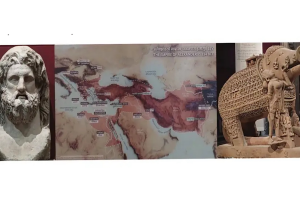Across the world, work landscapes are changing drastically. More than 50 per cent of all extant occupations will not exist 10 years from now and most employers have moved in that direction already. The shift from extensive use of manpower and skill to automation is evidently threatening the careers of many from the millennial generation in this country. India, with its youth population at more than 70 per cent, needs to preserve their future.
Work culture has also evolved from a well-oiled patriarchal setup managing small units to current international organisations while remaining focused on harnessing the benefits of a globalised economy. Nevertheless, units are becoming more disparate and globalisation has been concomitant with many collaboration challenges. These changes demand more communication, innovation, cognition, and analytical skills than straightforward core domain specialisation.
This reform in the industry has left the existing curriculum used widely in our education system outdated and made it imperative for educational institutions to evolve as well. Hence, management institutes have now begun reinventing their pedagogical content to match the needs of changing dynamics in the industry.
Freshers need experience: Employers look for experience among fresh graduates — be it full-time, part-time, internships, contractual or any other. It is because they realise the need for problem-solving skills that one largely imbibes only after facing real-life business challenges and situations. However, this paradoxical demand by employers often persuades students to opt for internships and projects that don’t permit them the opportunity of facing actual situations and challenges. Work done is majorly superficial and hence, the outcome is futile.
This is where a number of world class institutions have resorted to experiential learning in and beyond the classroom. It is positively critical for a potential employee as well as an entrepreneur, especially, in India which is plagued with poor levels of youth employability. Sadly, this requirement for a project-based curriculum is lacking in the Indian management education system with most management institutes offering only a two-month internship in a two-year course.
Minds are like parachutes: After experience, the one human skill that is unequivocally treasured in every organisation is critical thinking. The need to apply thought is essential learning for the millennial generation. Current pedagogy focuses more on literacy rather than education, and thought takes a backseat.
Innovation is rare and sheep mentality is near ubiquitous. In such a scenario, career advancement becomes an unachievable goal. The imperatives of business today demand an acceptance of multi-dimensional ideas and a broad perspective. Because minds, like parachutes, work only when they are open.
Nurture curiosity and innovation: Very few universities in India, today, boast of a curriculum that embraces technology, industry collaboration, and development for entrepreneurs. Management courses should be designed for all-round development of each graduate.
They must involve not just learning the art and science of management, but also the virtues and skills required to make an impact in the society and industry they are about to enter. That is why some MBA curriculums include courses like artificial intelligence and design thinking.
Learn how to learn: Experiential learning works on the learning-bydoing model and is tailored to meet the growing needs of businesses at all levels of management. This learning through hands-on experience may be ensured through a two-year live capstone project, along with case studies, live examples, and simulations.
Learning beyond the classroom should reflect in the teaching methodology which includes constant mentoring by industry experts, along with informative lectures, case studies, business games, role-plays, industry visits, and mini projects that most regular management institutes incorporate in their pedagogy. Expert faculty and mentors from the industry can make the students’ learning experience more exciting and meaningful, catalysing their growth and development.
Students should be persuaded to work upon real-life problems and solve them by the end of their course. This will not only enrich their skill set, but also reflect as experience in the eyes of a potential employer. There must be a multi-disciplinary curriculum to help students inculcate in themselves, core managerial skills as well as leadership, effective communication, critical thinking, creative problem-solving and networking abilities.
Moreover, management students need to widen their perspective through the understanding of related areas of liberal arts and sciences —the curriculum needs to be focused on the overall personal growth of the students. Only then will they become innovative planners and technologically competent leaders of tomorrow.
The writer is vice chancellor, JK Lakshmipat University











